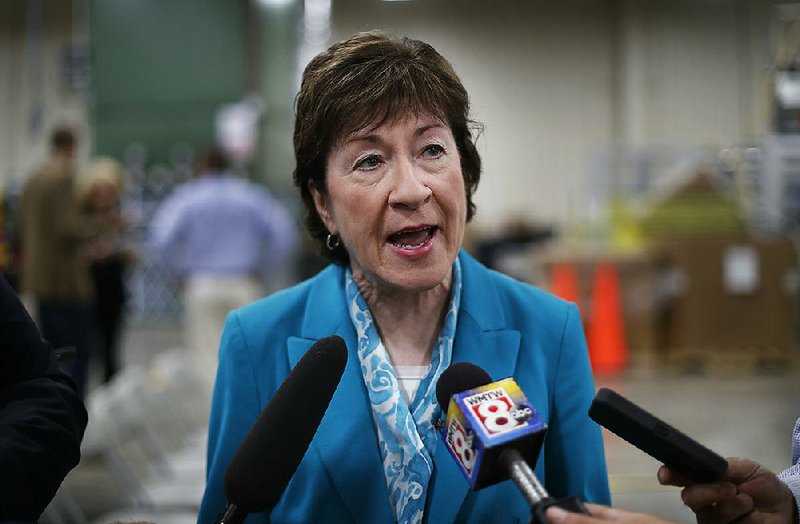WASHINGTON -- Senate Republicans' latest attempt to undo the Patient Protection and Affordable Care Act met hardening resistance from key members Sunday, even as advocates vowed to keep pushing for a vote this week.
With party leaders just one "no" vote away from defeat, Republican senators from across the political spectrum distanced themselves from the plan written by Sens. Bill Cassidy, R-La., and Lindsey Graham, R-S.C. They voiced opinions ranging from measured skepticism to outright hostility toward a proposal that was already trending toward failure over the past three days.
But Cassidy and Graham are expected today to propose giving Alaska and Maine more funding than initially offered in an attempt to sway senators from those states, according to a summary obtained by The Washington Post. Republicans Lisa Murkowski of Alaska and Susan Collins of Maine have expressed concerns about the bill but have yet to say how they would vote.
The Cassidy-Graham legislation would overhaul the Affordable Care Act by lumping together the current law's spending on insurance subsidies and expanded Medicaid and redistributing it to states in the form of block grants. Alaska would get 3 percent more funding between 2020 and 2026 than under current law, and Maine would get 43 percent more funding during that time period, according to the summary.
[INTERACTIVE: Compare House, Senate bills with Affordable Care Act]
Aides to Murkowski and Collins did not immediately respond to requests for comment late Sunday.
The fresh discord over a signature Republican promise added turbulence to the start of a critical week for President Donald Trump and Senate Majority Leader Mitch McConnell, R-Ky. In addition to health care, both are watching Tuesday's special election primary runoff in Alabama, a high-stakes intraparty fight between establishment Republicans and conservatives that could set the tone for the midterm elections next year. GOP leaders are also expected to unveil their most detailed blueprint yet of tax cuts they hope to pass by the end of the year.
Collins, a moderate Republican who has opposed previous efforts that cut Medicaid and lifted coverage requirements, said in a TV interview that it was "very difficult" to envision voting for the health-care bill.
Sen. Ted Cruz, R-Texas, a conservative who has advocated for a more far-reaching repeal of the health care law, said he and at least one other colleague do not back the measure "right now."
[PRESIDENT TRUMP: Timeline, appointments, executive orders + guide to actions in first 200 days]
And Sen. Rand Paul, R-Ky., who has stated definitively that he opposes the current measure, showed no signs of backing down absent dramatic changes to the bill's core approach that likely would come at the cost of other Republican votes.
Speaking Sunday on CNN's State of the Union, Collins said the bill has been rushed too fast for a thorough study of its full impact. She said her concerns include keeping protections for pre-existing conditions and not decimating Medicaid, the state-federal health program for the poor.
"It is very difficult for me to envision a scenario where I would end up voting for this bill," Collins said. "I have a number of serious reservations about it."
In a separate appearance on CBS, Collins said the sole planned hearing scheduled for today to consider a measure that would drastically alter many elements of health care in the U.S. is "not even close to enough."
Collins voted against a July repeal bill and is a key swing vote in the current dynamic. She said she chatted at length with Vice President Mike Pence on Saturday, but it wasn't enough to sway her. She said she wants to see the limited analysis due out this week from the nonpartisan Congressional Budget Office before she makes a final decision.
Two Republican senators -- Paul and John McCain, Ariz. -- have already said they would vote against Cassidy-Graham. A third would be enough to defeat the bill, since no Democrats are expected to support it. Republicans hold a 52-48 advantage in the Senate and can lose only two of their own and still pass legislation with the help of a tiebreaking vote from Pence.
The bill has been roundly rejected by influential national groups representing physicians, hospitals and insurers. Over the weekend, six such organizations, including the American Medical Association and American Hospital Association, issued a joint statement urging the Senate to reject it.
While the budget office plans to release a "preliminary assessment" early this week, officials there have said they will not be able to provide estimates of how Cassidy-Graham would affect insurance premiums or the number of people with coverage "for at least several weeks." Trump and McConnell are trying to bring the bill to a vote by the end of this week to take advantage of a procedural rule allowing the plan to pass with just 51 votes.
It remained far from clear Sunday that they could get even close to that number.
Speaking about the bill Sunday at the Texas Tribune Festival in Austin, Cruz said: "Right now, they don't have my vote. And I don't think they have Mike Lee's either," referring to one of Utah's senators and a fellow conservative.
Cruz said that he and Lee met with Graham and Cassidy last week to propose changes to the measure that would get them to yes. Their changes were not included in the latest draft.
Conn Carroll, a Lee spokesman, said Sunday: "We want some technical changes. We are working with Cassidy, but we haven't committed to anything yet."
Graham and Cassidy appeared on ABC's This Week with George Stephanopoulos, where they defended their plan and vowed to keep up their efforts to shepherd it to passage.
"We're moving forward. And we'll see what happens next week. I'm very excited about it," Graham said. The South Carolina Republican mentioned Collins and Paul as he made his pitch.
"Rand Paul objects to the taxes," he said. "But when you look at the bill, Rand, we save a lot of money over time for Medicaid. We put a cap on Obamacare growth."
Paul said in a Sunday interview that he broadly opposes a keystone of the Republican plan: issuing "block grants" to states to use federal funds being spent on Medicaid expansion and subsidies as they wish. But he is willing to hear out suggestions about how that aspect of the bill could be constricted.
"Would I talk to them if they said they wanted to make the block grants half as much? I might," Paul said. "But I'm afraid you get back in the box where the moderates want more and the conservatives want less."
Paul, an ophthalmologist, said the obvious next step for Republicans would be to bring up a bill that includes provisions that he believes have support in the GOP cloakroom: capping taxpayers' expenditures on Medicaid spending and giving states control, curbing regulations and allowing people to join health associations where they could purchase out-of-state insurance plans.
"All of those could be in a bill, and you could pass that. They're going to have to decide whether they're willing to do that without block granting," Paul said. "The problem I have with block grants is that looks like I've affirmatively said I'm OK with 90 percent of Obamacare as long as we reshuffle it and give it to Republican states. That's a horrible message."
The proposal, which would also dramatically cut Medicaid spending over time, has drawn concerns from Republicans from states that have expanded Medicaid under the Affordable Care Act. In an interview Sunday on CBS' Face The Nation, Sen. Cory Gardner, R-Colo., whose state expanded Medicaid, said he needs more information before he'll take a position.
"I think the CBO will have a role to play in this," Gardner said. "I believe there's information that will be coming through a committee hearing on Monday and additional text changes that will add additional information."
Asked on This Week what he will tell people if he comes up short, Graham responded: "That I did everything I could to get money and power out of Washington to give you better health care closer to where you live, and I'm not going to stop fighting."
He also held up the possibility of using health care as a negotiating tactic in future legislative talks.
"I'm on the Budget Committee," he said, adding, "we're not going to vote for a budget resolution that doesn't allow the health care debate to continue."
Information for this article was contributed by Sean Sullivan, Paige Winfield Cunningham, Abby Phillip, Robert Costa, Amy Goldstein, Juliet Eilperin and Carol Morello of The Washington Post; Alan Fram and Catherine Lucey of The Associated Press; and by Terrence Dopp, Ben Brody, Mark Niquette and Laura Litvan of Bloomberg News.
A Section on 09/25/2017

